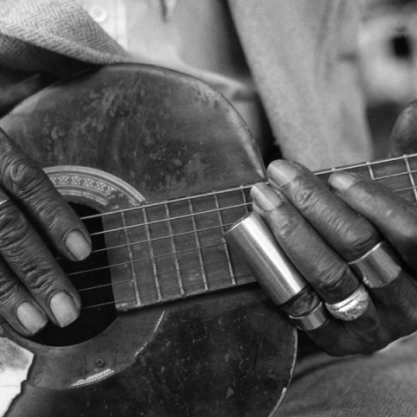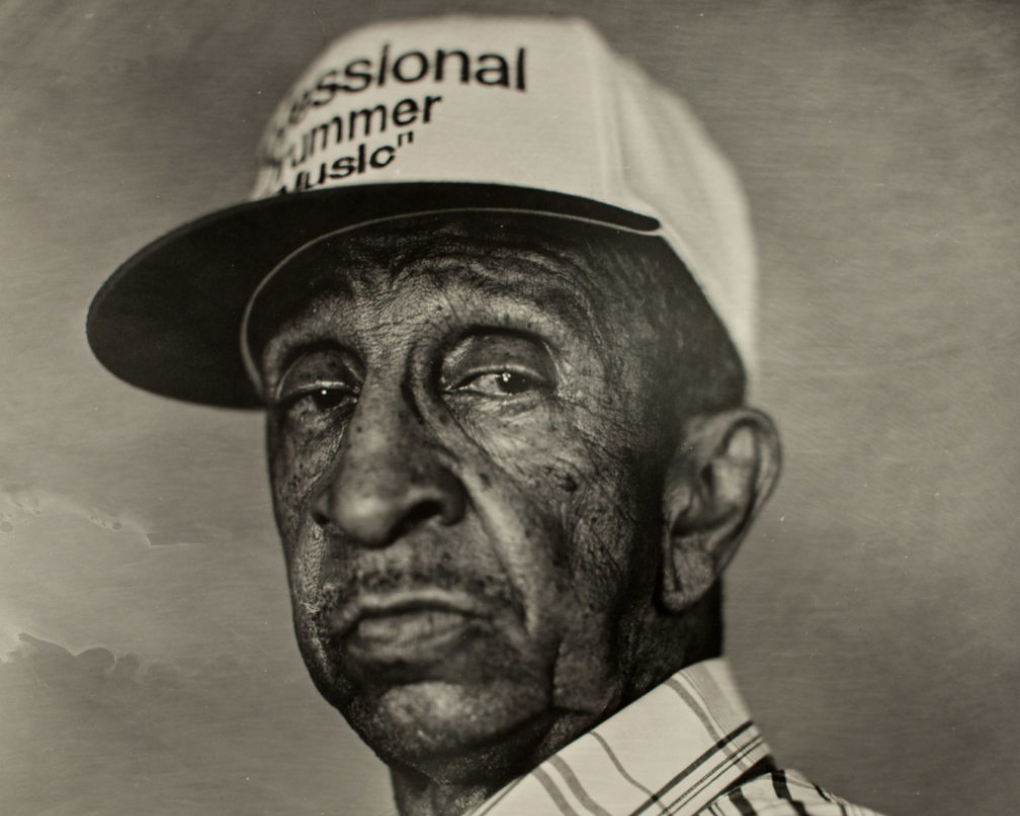In Memory: Big Ron Hunter & Bubba Norwood
Known as “The world’s happiest bluesman,” Big Ron Hunter projected a sense of happy-go-lucky joy throughout his career. It was an outlook he maintained up to the very end, before his July 7 death of congestive heart failure. He was 71 years old.
“Big Ron was a very happy person, always with a good story to tell,” said his friend and fellow performer Pat “Mother Blues” Cohen. “He’d do anything he could to help anybody. The last time I saw him was a benefit for him in Winston-Salem, and he was happy. ‘I’m gonna be better,’ he said. ‘I’m gonna be okay.’ The crazy thing is, he almost made me believe it. When he didn’t pull through, I was not surprised but I was surprised if that makes any sense.”
Born in 1953, Hunter grew up in Winston-Salem, North Carolina. His earliest exposure to music in general and the blues in particular came from Hunter’s sharecropper father. And while he worked a series of day jobs over the years to make ends meet, music was what made Hunter the happiest.
That was especially the case after he met up with Guitar Gabriel, Robert “Nyles” Jones, in the mid-1980s. Along with encouraging Hunter to pursue his own songwriting, Gabriel, also got him into the Music Maker Foundation circle after co-founding the organization in 1994.
“He was not actually a typical bluesman,” said Music Maker executive director Tim Duffy. “He landed more in that spot where blues, country and singer-songwriters mix together. A modern Piedmont blues guy, very well-loved, and he wrote some wonderful tunes. We traveled the world playing — Belgium, Australia, the Lincoln Center – and he was always laughing and jovial.”
Hunter had a loping, easy-going style of guitar strumming, accompanied by his honeyed croon on songs like “Not Gonna Stress Myself” and “How Lucky Can One Man Be.” He was also a generous and skilled collaborator, willing to play music with anyone regardless of their ability.
Duffy recalled seeing Hunter with beginner musicians overcome with nervousness about playing guitar in front of anyone else. But Hunter always found a way to set them at ease, bringing others into the experience of community through music.
“He will be really truly missed,” said Cohen, who Hunter brought into the Music Maker fold after she lost her home in New Orleans to Hurricane Katrina in 2005. “His cheerfulness, his happiness – I never met anybody like him. I always say to people, live your life in a way that you’ll like what is said about you after you’re gone. And what I’ll say about Big Ron is he was a genuinely kind, generous person. Never fake. It didn’t matter who else was around, that’s who he was. There are not a lot of genuinely kind people out there, so I try to take that lesson from him.”
James “Bubba” Norwood, who recently died from heart-related issues at the age of 82, was a drummer, and one of the best – and he started early, long before becoming Music Maker Foundation’s first-call drummer. A native of Carrboro, North Carolina, he first gained notice as a teenager playing on the scene with the legendary local party band Doug Clark and the Hot Nuts.
But what really punched Norwood’s ticket was an invitation to join the Ike & Tina Turner Revue, which found itself in need of a drummer. Norwood signed on as the new drummer in their Kings of Rhythm backup band in 1961, spending nearly a decade in the ensemble. It was difficult, demanding work.
“No one really understands how hard musicians worked back then,” said Music Maker Foundation executive Tim Duffy. “They were playing 300 shows a year on top of rehearsals. So they’d drive all day, play a show and then rehearse all night if Ike didn’t like how it had gone. Then they’d get back on the bus and do it again the next day. Amazing exactitude. It was very strict, not a party scene. Almost like the Army.”
After his time with Turner ended, Norwood toured with other acts and played recording sessions in Los Angeles. A naturally versatile drummer who could play anything, Norwood amassed a Hall of Fame’s worth of credits: Marvin Gaye, Little Richard, Major Lance, Archie Bell & the Drells, Albert King and even The Monkees. Eventually Norwood retired from the road and moved back to North Carolina, where he became Music Maker’s unofficial house drummer starting in 2009.
Former Outlaws bassist Harvey Dalton Arnold was his frequent playing partner and would hang out with Norwood just to hear his stories of life on the road. He also came away with a few stories about Norwood himself, who could be as demanding as any of his former employers when it came to getting the music right.
“He’d fuss at me a little, ‘Don’t play so much,’” said Arnold. “But he wanted everything to sound right. The ironic part is that it involved less playing, not more. He was capable of anything but played for the betterment of the song, which takes a level of maturity some musicians never reach. Playing with him, I could always relax because I knew the groove and tempo would be there.”
Even when the live-music industry shut down during the Coronavirus pandemic in 2020, Norwood continued practicing to keep his chops up. But in recent years, his ailments prevented him from taking on as many gigs as he wanted to. Arnold knew the end was near when Norwood had to bow out of a gig over health concerns.
“He was failing a bit toward the end,” Arnold said. “He would’ve taken a gig the day after he died if he could, if you know what I mean. But he was a great player and a fine gentleman. A proud man, and he had a right to be.”

Get involved
& give back
The Music Maker Foundation is a 501(c)(3) nonprofit organization that depends on thousands of supporters. Together, we work to meet the day-to-day needs of the artists who create traditional American music, ensure their voices are heard, and give all people access to our nation’s hidden musical treasures. Please contribute or shop our store today.


